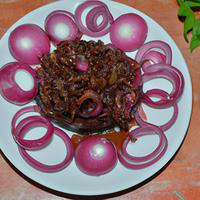
1 serving (50 grams) contains 60 calories, 0.5 grams of protein, 1.5 grams of fat, and 14.0 grams of carbohydrates.

Log this food in SnapCalorie

Nutrition Information
Calories |
283.9 | ||
|---|---|---|---|
% Daily Value* |
|||
| Total Fat | 7.1 g | 9% | |
| Saturated Fat | 1.2 g | 6% | |
| Polyunsaturated Fat | 0 g | ||
| Cholesterol | 0 mg | 0% | |
| Sodium | 23.7 mg | 1% | |
| Total Carbohydrates | 66.2 g | 24% | |
| Dietary Fiber | 4.7 g | 16% | |
| Sugars | 47.3 g | ||
| protein | 2.4 g | 4% | |
| Vitamin D | 0 mcg | 0% | |
| Calcium | 71.0 mg | 5% | |
| Iron | 0.7 mg | 3% | |
| Potassium | 354.9 mg | 7% | |
* Percent Daily Values are based on a 2,000 calorie diet. Your daily values may be higher or lower depending on your calorie needs.
Food Attributes
Source of Calories
About Red pnion carmelised
Red onion caramelized is a flavorful preparation of red onions slowly cooked until their natural sugars break down, creating a rich, sweet, and savory taste. Originating from European culinary traditions, particularly French and Italian cuisines, caramelized red onions are commonly used as toppings for burgers, pizzas, or incorporated into sauces, soups, and salads. The ingredients typically include thinly sliced red onions, a small amount of oil or butter, and sometimes a hint of balsamic vinegar or sugar to enhance sweetness. Nutritionally, red onions are a good source of vitamins such as vitamin C, and compounds like quercetin, which may offer antioxidant benefits. However, the caramelization process often requires added fats and, occasionally, sugar, which can increase calorie content. Moderation is key for those watching their calorie or fat intake, while still enjoying this versatile and delicious addition to a wide range of dishes.



